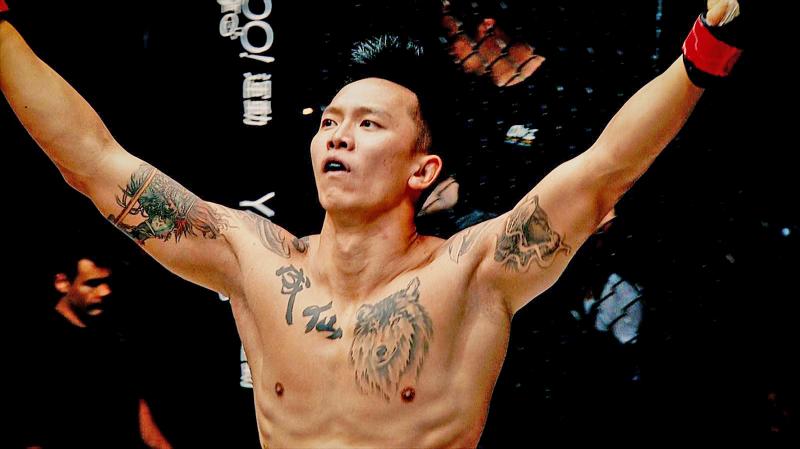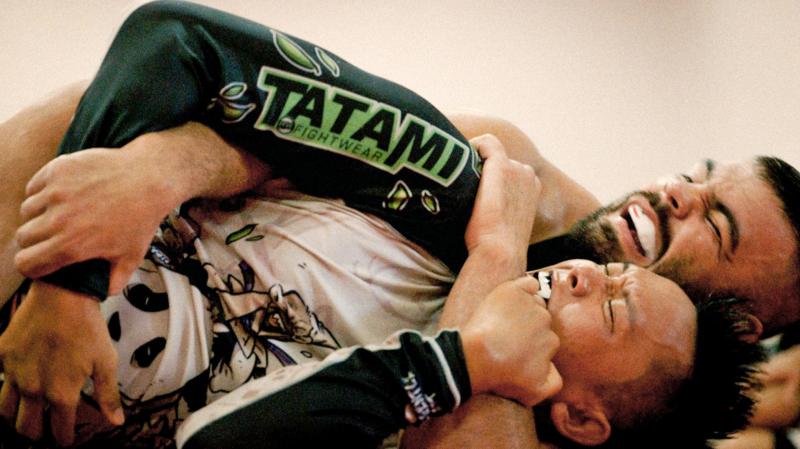The Road Less Traveled (逆者) can get a bit preachy about defying all obstacles to pursue one’s dreams — the ending even includes a message by director Martin Rustandi encouraging the audience to be brave and dare to fail.
Though times are changing, it still isn’t easy in Taiwan for someone to defy parental and societal expectations to pursue a dangerous occupation that rarely guarantees a financial winfall — especially when you’ve already achieved conventional success as a married 33-year-old investment banker earning more than NT$6 million a year.
That’s what this documentary of mixed martial arts (MMA) fighter Jeff “The Machine” Huang (黃育仁) is about, rather than his combat abilities or his career accomplishments. In fact, after bursting onto the scene in 2012 and knocking out his first opponent, he’s shown losing more often than winning, fighting more experienced opponents who are often 10 years younger (for the record, Huang finished 6-4-0 over a six-year career).

Photo courtesy of Activator Marketing Co
Huang sacrificed nearly everything to pursue his dream. He not only quit his high-paying job, his wife left him over the decision, leading to much soul-searching. There’s not much money in this cutthroat field, especially in Taiwan. In one scene, Huang is seen selling his prized collection of sneakers while talking about his former lavish lifestyle, when he regularly bought expensive stuff on a whim.
In the beginning, Huang’s family constantly criticizes him, saying things like he’s too old to be an MMA fighter, his dream isn’t realistic and he needs to “pick up the slack” and help support his aging mother and relatives. His mother hopes that this is just a phase, and tells the camera that unlike Western parents, Asian parents place great importance on making sure their children take the right path toward a good future. She can’t bear to see Huang take up such a violent profession, but she also wonders who is going to take care of her and provide her with a comfortable life in her elderly years.
Rustandi, who hails from Indonesia but is based in Taiwan, seems to share the same drive to pursue his passion regardless of finances, and spent seven years and nearly NT$10 million telling this story of a kindred spirit.

Photo courtesy of Activator Marketing Co
Rustandi’s once well-off parents went bankrupt when he was in high school. His father abandoned the family, while his mother moved to Taiwan to work as a migrant laborer. Despite having a degree in information engineering, Rustandi never gave up his goal of becoming a filmmaker. While studying the craft in Taiwan, he met Huang during the early stages of his MMA career.
Rustandi planned to film for one year, but it turned into six as Huang continued to push forward.
The time and money spent on this documentary is evident. Rustandi appears to have had full access to Huang, capturing intimate moments with his family, the close-knit camaraderie with his training partner and fighting team, as well as candid scenes of him hanging out and chatting about his philosophy toward life and martial arts. The production values are impressive, with stylized and carefully choreographed fight scenes from varying angles, speed and motion blurs, while the soundtrack offers an appropriate mix of adrenaline rush and quiet contemplation.

Photo courtesy of Activator Marketing Co
Huang talks throughout the film about how society judges people by their wealth and status, and how he’s much happier now than when he was a banker. These parts get a bit repetitive, but it’s the crux of the movie, and it seems to genuinely be what keeps Huang going, despite arguably not finding as much success in the fighting world as he did in finance. In one scene, he’s knocked out in nine seconds after a whole year of grueling training, but he doesn’t consider once in the film going back to his old job.
This is no fairy-tale sports drama where the protagonist defies all odds to win it all. It’s a realistic, heartfelt portrayal of the ups and downs of pursuing one’s passions and the joy one finds in it regardless of “success.” And that’s something few people have the courage or resources to do.

April 28 to May 4 During the Japanese colonial era, a city’s “first” high school typically served Japanese students, while Taiwanese attended the “second” high school. Only in Taichung was this reversed. That’s because when Taichung First High School opened its doors on May 1, 1915 to serve Taiwanese students who were previously barred from secondary education, it was the only high school in town. Former principal Hideo Azukisawa threatened to quit when the government in 1922 attempted to transfer the “first” designation to a new local high school for Japanese students, leading to this unusual situation. Prior to the Taichung First

The Ministry of Education last month proposed a nationwide ban on mobile devices in schools, aiming to curb concerns over student phone addiction. Under the revised regulation, which will take effect in August, teachers and schools will be required to collect mobile devices — including phones, laptops and wearables devices — for safekeeping during school hours, unless they are being used for educational purposes. For Chang Fong-ching (張鳳琴), the ban will have a positive impact. “It’s a good move,” says the professor in the department of

On April 17, Chinese Nationalist Party (KMT) Chairman Eric Chu (朱立倫) launched a bold campaign to revive and revitalize the KMT base by calling for an impromptu rally at the Taipei prosecutor’s offices to protest recent arrests of KMT recall campaigners over allegations of forgery and fraud involving signatures of dead voters. The protest had no time to apply for permits and was illegal, but that played into the sense of opposition grievance at alleged weaponization of the judiciary by the Democratic Progressive Party (DPP) to “annihilate” the opposition parties. Blamed for faltering recall campaigns and faced with a KMT chair

Article 2 of the Additional Articles of the Constitution of the Republic of China (中華民國憲法增修條文) stipulates that upon a vote of no confidence in the premier, the president can dissolve the legislature within 10 days. If the legislature is dissolved, a new legislative election must be held within 60 days, and the legislators’ terms will then be reckoned from that election. Two weeks ago Taipei Mayor Chiang Wan-an (蔣萬安) of the Chinese Nationalist Party (KMT) proposed that the legislature hold a vote of no confidence in the premier and dare the president to dissolve the legislature. The legislature is currently controlled